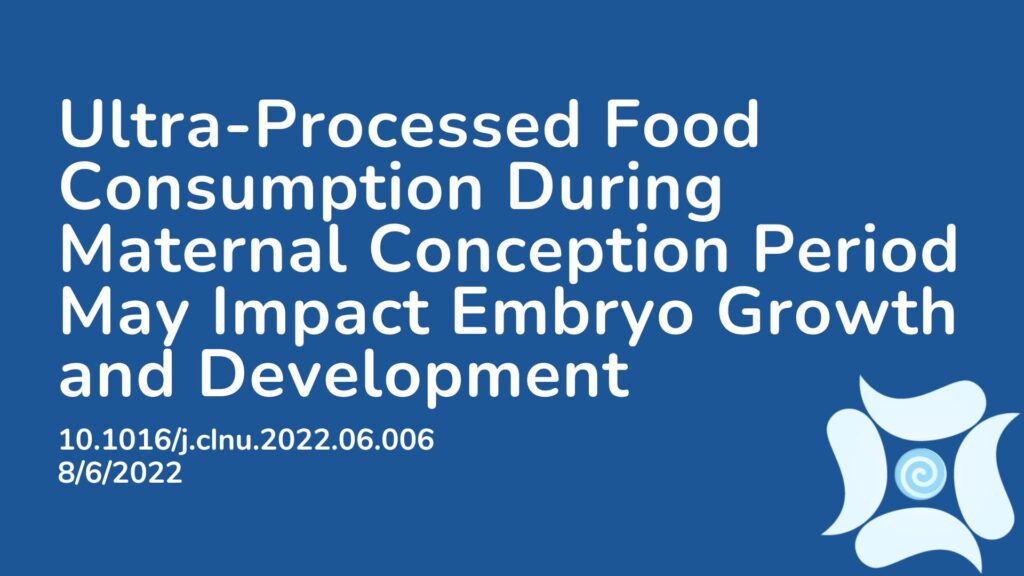Summary: In the last two decades, western diets have shifted towards more processed and packaged food. In Europe, it is reported that 10-50% of household food items are defined as ultra-processed foods (UPF), meaning they have been highly manipulated and usually contain added ingredients that are not whole-foods. UPF also commonly contain large amounts of added saturated fat, salt and sugar and lack nutrients or fiber. This paper looks at the role of UPF during the maternal conception period and whether these dietary inclusions contribute to changes in embryonic growth and development. No evidence or knowledge exists on this topic at this time. The authors assessed a total of 701 pregnancies, 446 of which were conceived naturally and 255 via IVF or other conception methods. A food frequency questionnaire for each participant was used to determine energy consumed from UPF. The results showed that consumption of UPF during the maternal conception period was associated with smaller embryonic growth, meaning that public or primary health interventions that promote a healthy diet and a reduction in UPF intake during conception is beneficial for the health of an embryo.
Abstract:
Background & aims: Periconceptional maternal dietary patterns contribute to embryonic growth and development. No knowledge is available about the impact of periconceptional maternal ultra-processed food consumption on embryonic growth. Therefore, the aim of the present study is to investigate the impact of periconceptional maternal ultra-processed food consumption on embryonic growth using repeated crown-rump length (CRL) and embryonic volume (EV) measurements. Methods: This study is embedded in the ongoing prospective observational Rotterdam periconceptional cohort (Predict Study). A total of 701 pregnancies, of which 446 were conceived after natural conception and 255 after IVF or ICSI treatment were included. Women were at least 18 years of age and were recruited at the outpatient clinic before 13+0 weeks of gestation. CRL and EV were measured using three-dimensional ultrasound datasets and virtual reality techniques at the 7th, 9th and 11th week of gestation. The food frequency questionnaire of each participant was used to calculate the percentage of maternal energy consumed from ultra-processed foods (PEI-UPF) for each participant. The association between PEI-UPF and the first trimester CRL and EV measurements was studied with linear mixed models and adjusted for potential confounders including maternal factors, gestational age, foetal sex, and total energy intake. Results: PEI-UPF ranged from 16% to 88%. In fully adjusted linear mixed models, a 10% increase in maternal PEI-UPF was significantly associated with smaller growth trajectories of CRL and EV (b −0.041 √mm (95% confidence interval (CI) −0.074 to −0.008), P = 0.02 and b −0.016 ∛cm (95% CI -0.030 to −0.001), P = 0.04, respectively). When additionally adjusted for micronutrient content of diet (vitamins B1, B2, B6, B11 and B12, and zinc), the associations for the CRL and EV measurements lost significance. Conclusion: Periconceptional maternal consumption of ultra-processed foods is associated with smaller embryonic growth. Interventions promoting healthy food practices during pregnancy could be beneficial for embryonic growth.
Article Publication Date: 8/6/2022
DOI: 10.1016/j.clnu.2022.06.006




